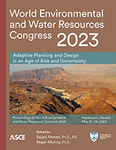An Agent-Based Modeling Approach to Simulate the Performance of Hybrid Water Systems and Rainwater Micro-Trading
Publication: World Environmental and Water Resources Congress 2023
ABSTRACT
As climate change and population growth exert more pressure on urban water systems, new water management strategies are needed. Water micro-trading is a novel economic strategy that aims to reduce urban water demand. In micro-trading, a household acts as a prosumer and collects surplus rainwater through rainwater harvesting. Prosumer households can trade rainwater with another consumer household that exerts an outdoor water demand. The traded water is transferred via an underground aquifer without the need for additional citywide infrastructure. New research is needed to quantify the effect of micro-trading on urban water supply and water table height. This research uses a data set from Perth, Australia, which contains 30-min water demand data for 36 households that use a variety of sources including rainwater and mains water, which is water provided through centralized drinking water infrastructure. These households are modeled as agents in an agent-based model (ABM). Agent actions include harvesting rainwater, trading water, and using water. The ABM is simulated to generate water consumption and groundwater contributions over a nine-month period. Water trading results are used as input to a groundwater model developed with MODFLOW to assess the effects on groundwater tables and sustainability. Preliminary results indicate that roughly 8% of consumer outdoor water demand can be offset using traded water. Research results will evaluate the impacts on water tables in the Greater Perth area. Results of this study demonstrate the effectiveness of micro-trading as a new water saving strategy.
Get full access to this article
View all available purchase options and get full access to this chapter.
REFERENCES
Bakker, M., Post, V., Langevin, C. D., Hughes, J. D., White, J. T., Starn, J. J., and Fienen, M. N. (2016). “Scripting MODFLOW Model Development Using Python and FloPy.” Groundwater, 54, 733–739.
Berglund, E. Z. (2015). “Using agent-based modeling for water resources planning and management.” Journal of Water Resources Planning and Management, 141, 04015025.
Bolton, E. R. (2022). Resource Trading Markets: Applying Agent-Based Models to Test New Paradigms for Water Security. North Carolina State University, Raleigh, NC.
Bureau of Meteorology. (2022). Weather Station Directory Jandakot Aero. Australian Government. <http://www.bom.gov.au/>. (Nov. 8, 2022).
Fornarelli, R., Anda, M., Dallas, S., and Morrison, G. (2022). “Smart metering technology and community participation: investigating household water usage and perceived value of hybrid water systems.” Water Supply, 22, 347–359.
Harbaugh, A. W., Langevin, C. D., Hughes, J. D., Niswonger, R. N., and Konikow, L. F. (2017). MODFLOW-2005 version 1.12.00, the U.S. Geological Survey modular groundwater model. U.S. Geological Survey Software Release, 03 February 2017.
Mini, C., Hogue, T. S., and Pincetl, S. (2014). “Estimation of Residential Outdoor Water Use in Los Angeles, California.” Landscape and Urban Planning, 127, 124–135.
Ramsey, E., Pesantez, J., Fasaee, M. A. K., Dicarlo, M., Monroe, J., and Berglund, E. Z. (2020). “A smart water grid for micro-trading rainwater: Hydraulic feasibility analysis.” Water, 12, 1–30.
Schmack, M., Anda, M., Dallas, S., and Fornarelli, R. (2019). “Urban water trading–hybrid water systems and niche opportunities in the urban water market–a literature review.” Environmental Technology Reviews, 8, 65–81.
Water Corporation. (2022). “Winter Sprinkler Switch-off – find out if you’re included” Water Corporation Help & Advice. <https://www.watercorporation.com.au/Help-and-advice/Watering-days/Winter-sprinkler-switch-off/Winter-sprinkler-switch-off>(Nov. 8, 2022).
Xu, C., Canci, M., Martin, M., Donnelly, M., and Stokes, R. (2008). Perth regional aquifer modelling system (PRAMS) model development: Application of the vertical flux model. Department of Water, Western Australia,.
Information & Authors
Information
Published In
History
Published online: May 18, 2023
ASCE Technical Topics:
Authors
Metrics & Citations
Metrics
Citations
Download citation
If you have the appropriate software installed, you can download article citation data to the citation manager of your choice. Simply select your manager software from the list below and click Download.
